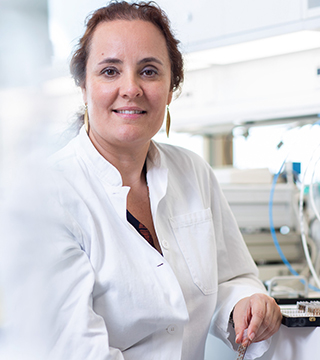Marina Romero-Ramos

“We have described that the brain immune response in the disease is early, dynamic, related to alpha-synuclein mishandling in neurons - and not a consequence of the neuronal death, as previously thought.”
Moving Parkinson’s disease towards personalised medicine
How can we define biomarkers that contribute to better diagnoses, more qualified follow up and ultimately personalised medicine for patients suffering from Parkinson’s disease? That is an urgent question for professor Marina Romero-Ramos, born 1970 and educated in Spain as a researcher in the field of basic and translational neuroimmunology.
Neurological diseases are the main cause of disability in the world. Among them, Parkinson’s disease is the fastest growing surpassing even Alzheimer. So far, no neuroprotective therapy is available.
Marina Romero-Ramos is interested in understanding the early events associated with the neurodegeneration caused by alpha-synuclein in Parkinson’s disease. Especially she is intrigued by the changes of the immune system in the disease and how they can influence neuronal fate.
“We have described that the brain immune response in the disease is early, dynamic, related to alpha-synuclein mishandling in neurons - and not a consequence of the neuronal death, as previously thought,” Marina Romero-Ramos says.
“Not only brain immune cells, but also peripheral immune cells are involved in the degeneration, and both the adaptive and innate immune system play a role in this event,” she adds.
Accordingly, Marina Romero-Ramos has described how peripheral immune modulation can protect neurons in the brain of rodent models of the disease. Her recent work focuses on the specific role of peripheral monocytes and macrophages in the degenerative progressive event in Parkinson’s disease.
“We work not only with rodent models of the disease, we also analyse blood immune cells from patients and try to decipher how these immune changes correlate to brain and symptomatic changes,” says Marina Romero-Ramos who is delighted about the translational aspect of her research.
“The best moment for me has been to see that changes we found in rodent models of the disease were also true in patients. This assures me that I am doing something promising and with potential that can be used for designing new therapies and – someday – personalised medicine,” she says.
For more information – CNS Disease Modeling Group: Romero Ramos Lab

“We have described that the brain immune response in the disease is early, dynamic, related to alpha-synuclein mishandling in neurons - and not a consequence of the neuronal death, as previously thought.”